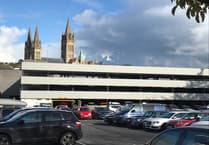THE next phase of a green initiative to cut carbon emissions and light pollution by turning off or dimming streetlights is being rolled out.
Cornwall Council is turning off some of its streetlights when most residents are asleep between the hours of midnight and 5am in areas including Carbis Bay, St Columb Major, St Neot and the Treverbyn parish.
The scheme also aims to help nature recovery and encourage nocturnal wildlife, protect designated Dark Skies areas, and save money on energy costs.
Streetlights in town centres where there is a strong night-time economy, areas where there is CCTV, and along main roads, will remain on or will be dimmed.
Streetlights will remain on, or be dimmed between midnight and 5am to reduce light pollution, in locations such as traffic signal junctions, pedestrian crossings, subways, some roundabouts and junctions.
Parts of town centres and footpaths that are still relatively busy during the night, on certain roads where there is traffic calming and speed humps, areas where there is CCTV or police surveillance equipment and entrances and exits to hospitals, police, ambulance and fire stations .
Councillor Richard Williams-Pears, the council’s portfolio holder for transport, said: “So far 4,918 of the council’s streetlights have been dimmed or turned off. That number will increase to 5,898 in this next phase.
“I want to reassure residents that safety is at the forefront in any decision about switching off streetlights. Before we embarked on this initiative, we consulted with the Safer Cornwall Partnership who continue to monitor the situation carefully and feedback any concerns.
“We won’t be compromising on safety as where risk assessments have shown that streetlights are still beneficial, they will be kept on, or will be dimmed once new LED bulbs are fitted.”
“Risk assessments will continue to be carried out and data shared with local stakeholders. Any concerns and requests, including requests from parish and town councils for areas where they want to see streetlights switched off or turned back on again, are fully considered.”
Cornwall Council’s vast network of streetlights currently contributes to around 30% of the council’s total carbon emissions.
Carbon reduction is a primary driver for taking action to replace streetlights and turn them off or dim them when appropriate.
All council-run streetlights in Cornwall are in the process of being replaced with energy saving LEDs as part of a programme to cut carbon emissions, as well as reduce electricity consumption. The new LED streetlights, which are a similar colour temperature to the previous lamps, will be remotely controlled and monitored.
Using low power technology, the streetlights can be adapted to the needs of local areas.
Residents can see for themselves where and when streetlights will be turned off or dimmed between the hours of midnight and 5am with an interactive map on the council website.




